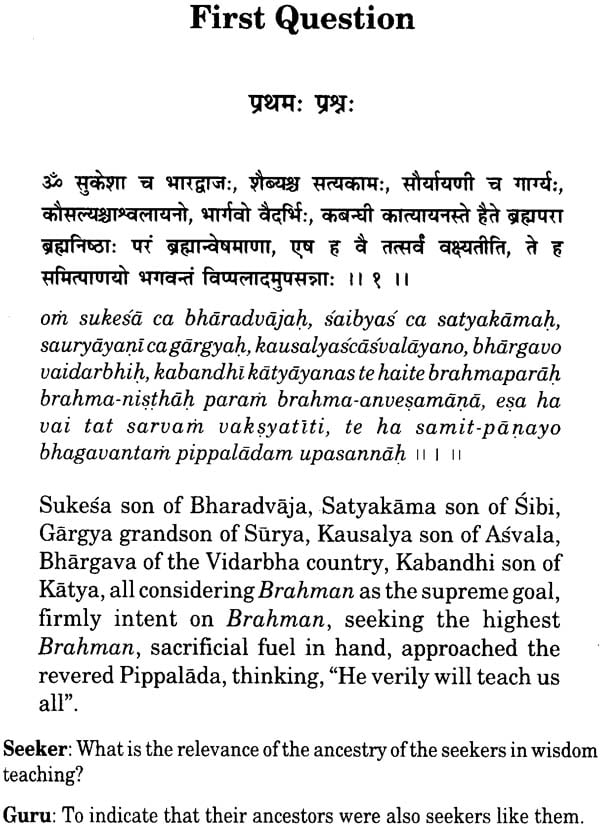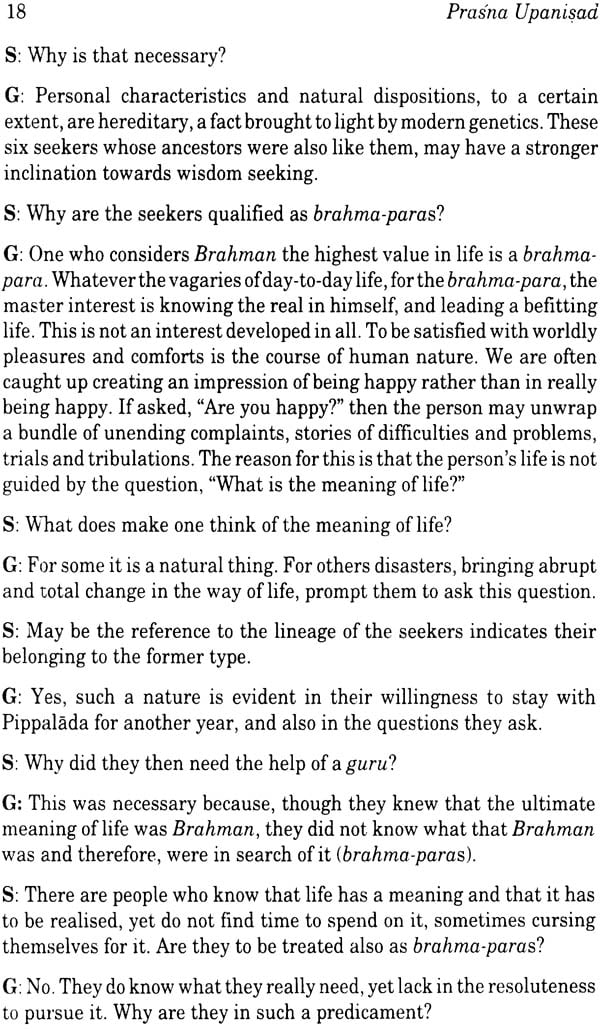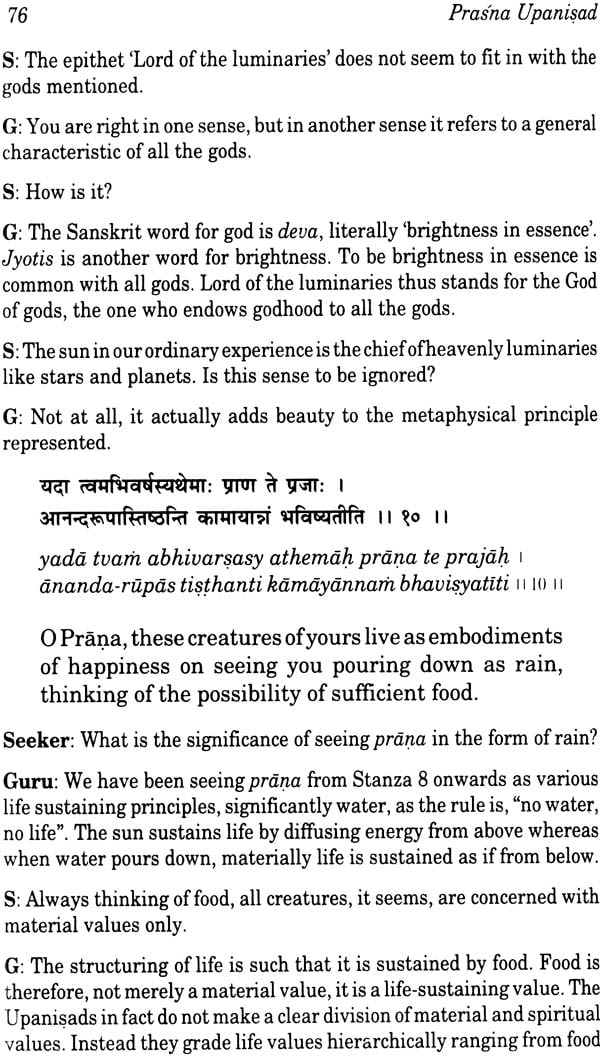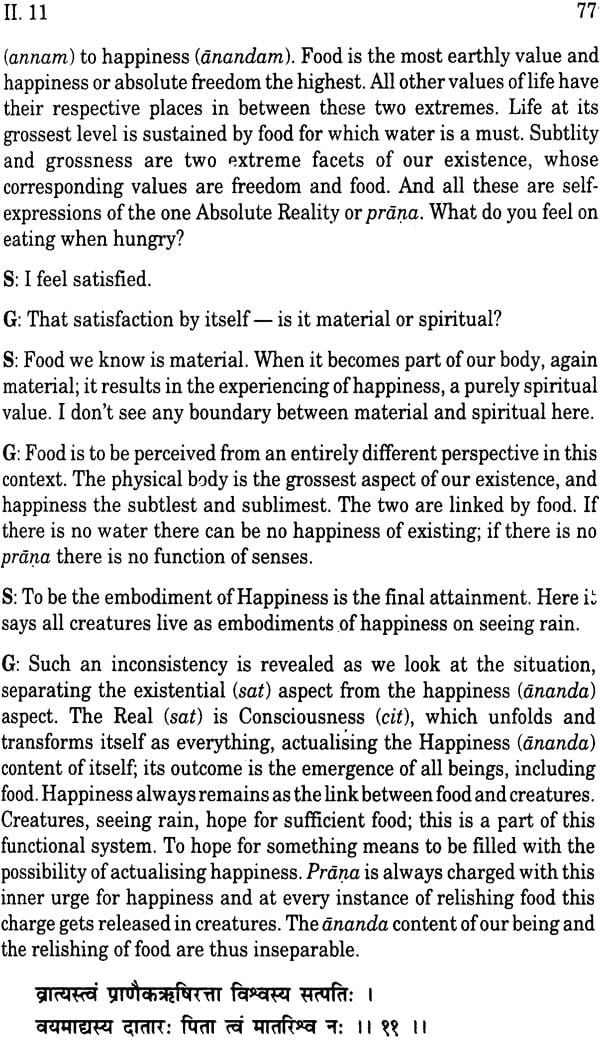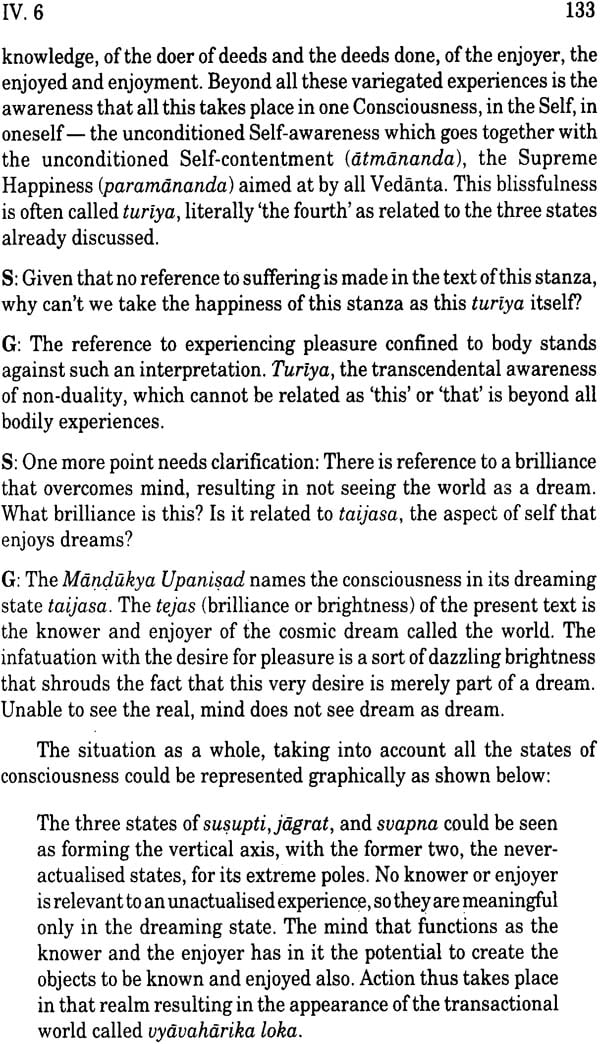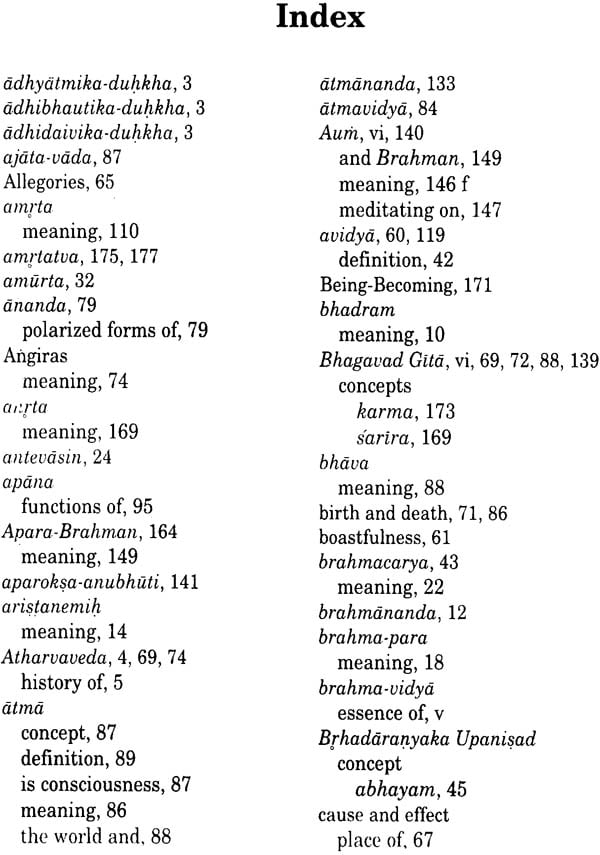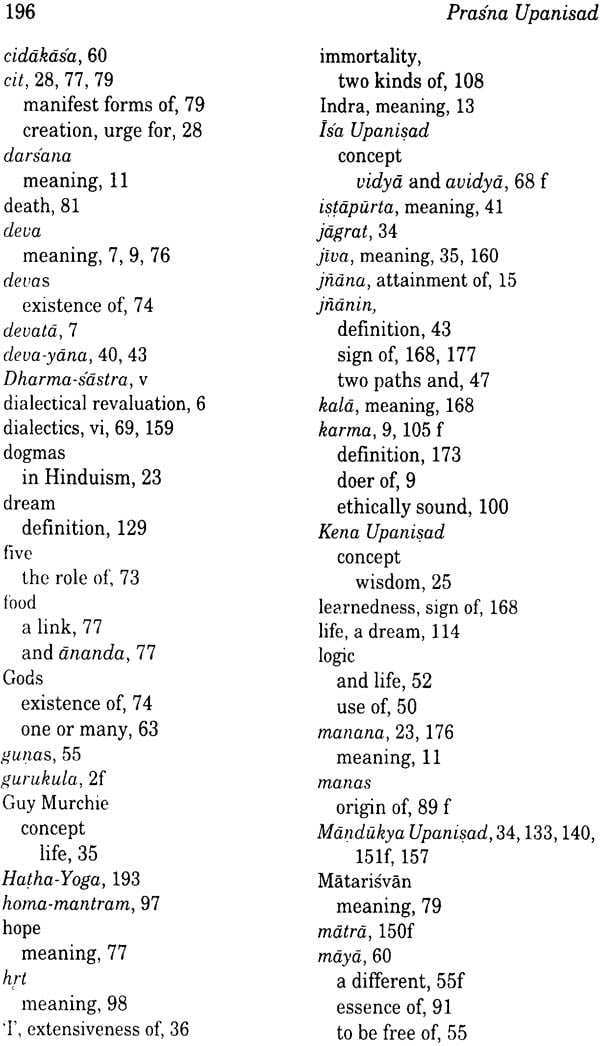
Prasna Upanisad (Sanskrit Text, Transliteration, Translation and Detailed Commentary)
Book Specification
| Item Code: | NAD362 |
| Author: | Swami Muni Narayana Prasad |
| Publisher: | D. K. Printworld Pvt. Ltd. |
| Language: | Sanskrit Text, Transliteration, Translation and Detailed Commentary |
| Edition: | 2012 |
| ISBN: | 9788124601297 |
| Pages: | 208 |
| Cover: | Paperback |
| Other Details | 8.5 inch x 5.5 inch |
| Weight | 270 gm |
Book Description
In Upanishads is articulated not only the quintessence of spiritual wisdom, but also the remarkable philosophical genius of the classical Hindu mind. Owing, however, to their complexity, metaphor, and even obscurity, Upanishad writings have been endlessly debated, discussed and written upon, more specially since Sankara's time. Swami Narayana Prasad's commentary is yet another valuable addition to the existing literature attempting, as it does, to rationally unlock the metaphysical subtleties of Prasna upanisad - with the master-key handed down to him in the disciples succession of Sri Narayana Guru.
Prasna Upanisad offers an enlightened exposition of brahmaoidua: knowledge of the Absolute/Supreme Reality. In an aptly thought-out dialectical situation, it offers a threadbare discussion of six questions which, centering around procreation/ origin of beings, prana: the most vital life-sustaining principle, functional states of the Self (puru$a), significance of meditating on AUM - lead to the finality of Vedantic wisdom: the sublimity of non-dual Reality: the param purusa of sixteen kalas.
With the English version of the Upanisad, Swami Prasad's interpretation highlights the true import of this metaphysical piece - spelling out its contexts in the light of what the author calls "the metalogic of yogic-buddhi" and all else that is allegorical, obscure and riddle-like. For the authenticity of this commentary, the author has had extensive discussions with a group of Vedantic scholars.
Swami Muni Narayana Prasad is the Guru and Head of Narayana Gurukula, a guru-disciple foundation open to all, irrespective of caste, creed, gender, religion or nation, aimed at promoting the Science of the Absolute (Brahma-vidya) as restated by Narayana Guru. A disciple of Nataraja Guru and Guru Nitya Chaitanya Yati, he has travelled widely teaching Indian philosophy. He has authored around eighty-five books in the Malayalam language. His English books are: commentaries on the [sa, Kena, Kaiha, MU1JQaka, Ma1JQakya, Taittirtva, Aitareya and Chandogva Upanisads, Vedanta Satras and Darsanamala of Narayana Guru, Three Acaryas and Narayana Guru, Karma and Reincarnation, Basic Lessons on India's Wisdom, The Philosophy of Narayana Guru, Life's Pilgrimage Through the cua, Collected Works of Narayana Guru, Naraya1Jasmrt*, and Philosophy Simplified for Youth.
All Upanishads teach the one and only secret wisdom, the very meaning of the word Upanishad being 'secret wisdom'. Through words the Upanishads try to impart knowledge of that which is beyond words. Known as Bhrahma-uidyti (wisdom of the Absolute) and Atma-uidya (wisdom of the Self), Upanishad teaching leads to one becoming fully aware of one's own self-content, which is none other than that of the world, and thus, it leads to seeing oneself identified with everything. Experiencing oneself in everything, and everything in oneself, marks the attainment of this wisdom, its ultimate benefit being the sense of absolute Freedom.
The Western mind may consider Upanishad teaching as being flawed by one major inadequacy - that it nowhere enjoins one to love others. While in one sense this appears to be a valid charge, we must keep in mind the fact that the Upanishads are part of a culture of seeing everything as part of one's self. Even the daily routines of life are to be based on this awareness, so that one would not even think of eating without sharing one's food, as the saying, atithi deuo bhaua (the guest varily is god) indicates.
There are certain scriptures called Dharma-Stistras that give special emphasis not only to loving others, but lay down detailed moral instructions as well. But they are relegated to a secondary position, as living a morally sound life guided by wisdom, without imposed moral codes, is considered higher than a life lived following formally structured moral codes.
Different Upanishads attempt to shed light on the one wisdom, answering different questions, some concisely (e.g., Ma1J4akya, Isa, Kena) and some elaborately (e.g., Brhadaranyoha, Chiindogya, Kaiha, Prasna, Murulaha), the words of the Upanishads are to be seen as wrappings; what is contained in them wrapped is the true wisdom. To open the wrapping and see for one self 'what-is in is the task of a keen student, an earnest seeker, to be done on his own.
It is possible that readers should wonder, as a Western friend did, why I should write a new commentary when there already exist numerous commentaries, beginning with Sankara's. My only answer is that I have been inspired to try a hand at applying the master-key provided by my teacher, N ataraja Guru (chief disciple and successor of Sri Narayana Guru), in unlocking the word-packages of this Upanisad to allow me as well as others to glimpse the mysterious secret hidden within. The methodological devise that has been made use of in this commentary, as in my other commentaries, is that of dialectics, which the Bhagavad GUa calls Yogabuddhi.
The Prasna Upanisad, in solving the problem of origin of beings, presents the philosophy of Brahma-vidya, as answers to the six questions asked to Pippalada by six seekers. Each leads to the other, and so on till the last one which reaches back to the first one, thus completing a full circle. These questions and answers deal with such topics as the actualities of begetting children on the one hand, and the sublimity of the non-dual Reality, the param purusa (Supreme Person) of sixteen kalas, on the other. The first question is centred on the procreation of beings through mating, the second on the pre-eminence of prat Ja in living beings, the third on the Self as the source aiprana, the fourth on the functional states of the Self, the fifth on meditatingAUM, the sixth on the Supreme purusa from whom arise all things.
Attempt has been mad~ in this commentary to unravel the riddle-like statements and contexts of the Upanishad in the light of the meta-logic of yoga-buddhi. This work is the result of the joint effort of a group of research scholars and inmate students of Narayana Gurukula. Each stanza has been privately pondered on by each of them followed by a group discussion. The ideas thus clarified were systematized and then put in writing, first in the Malayalam Language, my mother tongue, and then rendered into English. Mrs. Kala Remesh Krishnan of Ban galore edited it simply out of her love for wisdom and the Narayana Gurukula Movement. All of us in this group are thankful to Messrs D.K. Print world for their willingness to help these ideas reach the hands of those who are looking for new paths into the world of Upanishad wisdom.
| Preface | |
| Peace Invocation | 1 |
| Prasna I | 17 |
| Prasna II | 57 |
| Prasna III | 83 |
| Prasna IV | 111 |
| Prasna V | 145 |
| Prasna VI | 165 |
| Glossary | 181 |
| Index | 195 |
